Dr. Julia Dobroschke
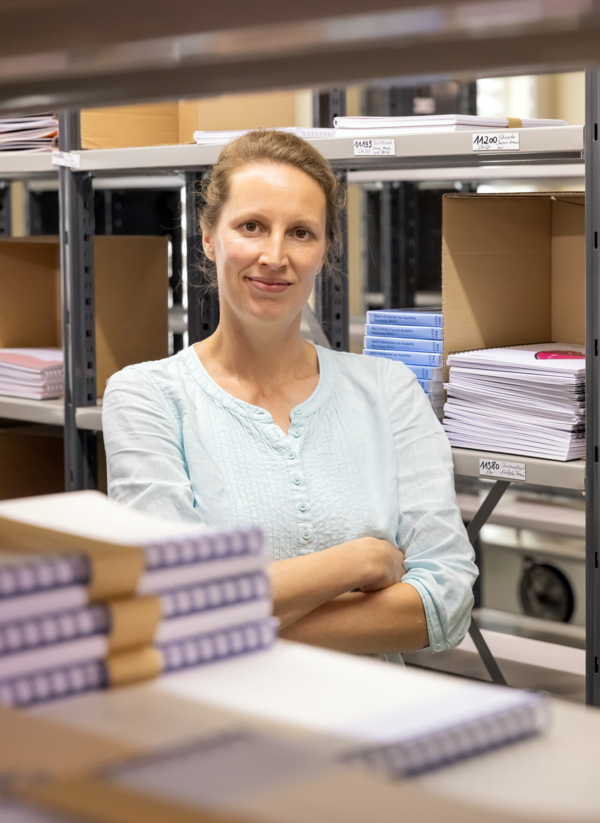
Dr. Julia Dobroschke, born in Leipzig, studied Publishing Production in the diploma program at HTWK Leipzig. Starting in 2009, she coordinated an IT project at the German Center for Accessible Reading (formerly DZB). From 2012 to 2015, she earned her doctorate at the University of Leipzig on textbooks in Universal Design. Since 2017, she has been leading the BIKOSAX team and the corresponding project area.
What memories do you associate with your time at HTWK Leipzig?
Worked a lot, learned a lot, well-structured study program
Why did you decide to pursue a doctorate at HTWK Leipzig?
The invitation or idea came from HTWK to apply for a scholarship. It worked out.
Who or what has particularly influenced you in your career so far?
Prof. Nikolaus, who supervised both my diploma thesis and my doctorate
How important are professional networks for your career?
Very important, as topics around the digital world are becoming more complex, and it is good to know many experts to ask for advice.
What tips or advice would you give to young women for their career planning?
Pursuing a doctorate is enjoyable if you love learning and have suitable supervision and funding. For your further career, don’t be afraid to take unconventional paths.
On what questions or topics can you be consulted?
(Digital) Accessibility, Universal Design
Prof. Dr. Carolin Helbig
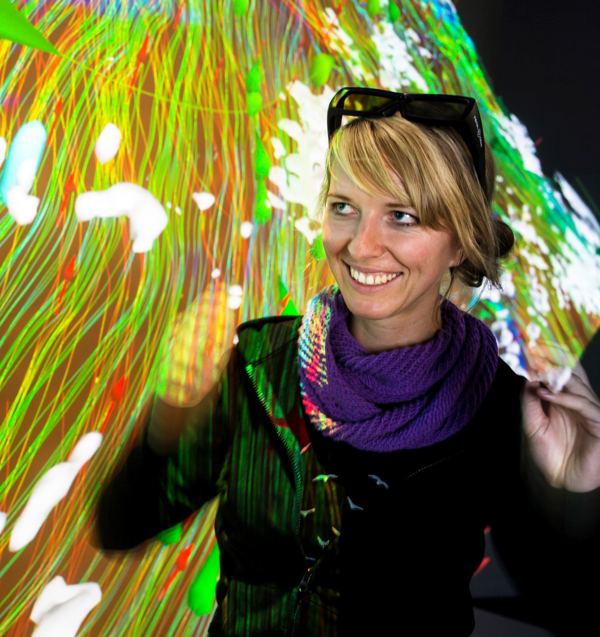
Prof. Dr. Carolin Helbig studied Media Informatics in the Bachelor and Master programs at HTWK Leipzig. As a scientist, she worked from 2011 to 2023 at the Helmholtz Centre for Environmental Research (UFZ) Leipzig, where she also earned her doctorate in collaboration with the Technical University of Dresden and HTWK Leipzig. Since the winter semester of 2023/2024, she has been a professor of Visualization and Data Analysis at the Coburg University of Applied Sciences and is researching the visualization of environmental data.
What memories do you associate with your time at HTWK Leipzig?
I associate my time at HTWK with a lot of input, learning, and exams. On the other hand, it was also about student life, semester parties, and especially university sports. In our program, there was a relatively fixed group of students, so we actually studied together from the Bachelor’s to the Master’s degree. That and the overall environment of the faculty had a familial feel.
Why did you decide to pursue a doctorate at HTWK Leipzig?
During my Master’s degree, my desire to pursue a doctorate grew. Through Prof. Michael Frank, I got in touch with the Helmholtz Centre for Environmental Research Leipzig and was able to find both a supervisor and a topic there. HTWK offered the opportunity for a doctoral scholarship from the European Social Fund (ESF). This allowed me to combine the foundations from my studies with research.
What was one of your biggest professional challenges and how did you overcome it?
The biggest challenge came after the birth of my child/children. Balancing professional aspirations, goals, and demands with the newly formed family was and still is not easy. It is achieved by constantly adapting to various professional and family phases and especially through an equal partnership. Unfortunately, it is still not a given in our society that one can choose both family and career.
Who or what has particularly influenced you in your career so far?
Overall, it is various people, experiences, and values that have particularly influenced me and motivated me to continually strive for personal and professional development.
How important are professional networks for your career?
They are of great importance, as both personal and professional exchanges are essential and important in my field. I gained insights and advice that are not found in any book and which were helpful and indispensable.
What tips or advice would you give to young women for their career planning?
Do not let yourself be guided by stereotypes, but by your personal strengths and goals. And find allies. Fortunately, more doors are open to young women today than in the past. Use that and dare to aim for ambitious positions.
Anja Ulrich
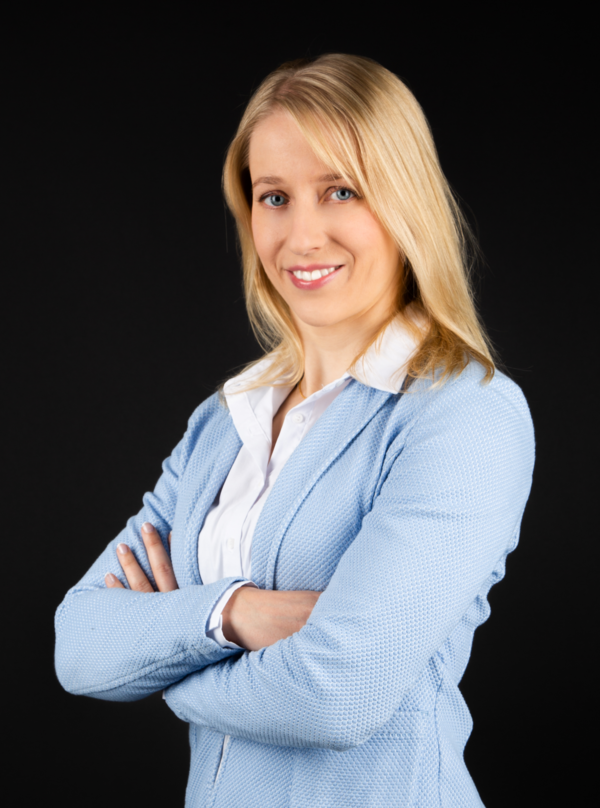
Anja Ulrich studied Packaging Technology for her Bachelor's degree and Printing and Packaging Technology for her Master's degree at HTWK Leipzig. After her studies, she worked in product development and then moved to the position of Clinical Project Manager at a global CDMO company in the chemical industry. Here she works in project management for global clinical trials.
What memories do you associate with your time at HTWK Leipzig?
During my time at HTWK Leipzig, I not only acquired specialized knowledge but also collected a multitude of unforgettable memories. The vibrant campus atmosphere, inspiring lectures, and collaboration with fellow students shaped my study period. I especially remember challenging projects that strengthened both my technical skills and teamwork abilities. The open and supportive environment of the university provided me with opportunities for personal and academic growth.
What excites you about your current job?
In my current position as a Clinical Project Manager at a global CDMO company, I am excited by the diverse blend of regulatory requirements from the pharmaceutical industry and the specialized knowledge I gained during my studies. Packaging specifications, especially in blinded studies, play a crucial role in my field. The complexity spans the entire supply chain, from multi-stage production steps to delivery to the patient, requiring a precise distribution strategy. The opportunity to participate in global clinical trials of all phases and actively contribute to patient healing or support deeply fascinates me. The prospect of the studied drugs potentially receiving market approval adds extra motivation to my work. I particularly appreciate the challenges posed by the different country requirements for clinical trials. The fact that I can act as a liaison between various organizations, departments, and parties makes my global role extremely exciting and varied.
What was one of your biggest professional challenges and how did you overcome it?
One of my biggest professional challenges was managing a highly complex global clinical trial, where not only different regulatory requirements and internal processes had to be harmonized, but a new process also had to be introduced. This challenge required a comprehensive strategic approach. To address this situation, I first developed a detailed project management concept that included all relevant factors as well as the new process. Introducing this process required careful planning and coordination to ensure its smooth integration into existing workflows. A clear communication strategy for all involved parties was also implemented. Close collaboration with internal teams ensured that the new process complied with regulations and was effectively integrated into existing structures. Continuous project monitoring allowed us to identify potential issues related to the new process early and take proactive measures. Through flexibility, quick adaptation to unexpected events, and clear communication, we were able to successfully navigate the challenges of the study and successfully establish and integrate the new process.
Who or what has particularly influenced you in your career so far?
Various influences have significantly shaped my career path. I would particularly like to highlight the professors at HTWK Leipzig and our program director, who were not only excellent teachers but also inspiring mentors. Their expertise and ability to convey knowledge accessibly greatly contributed to my professional development. Additionally, my international experiences during my studies in Finland and Scotland through the Erasmus program, enabled by HTWK Leipzig, had a significant impact on my perspectives. The international contacts, learning methods, and cultural insights gained there broadened my horizons and enriched me with valuable global perspectives. These experiences not only sharpened my intercultural sensitivity but also enhanced my ability to work with different ways of thinking and working. Overall, these diverse influences, from the professors at HTWK Leipzig to the international experiences through Erasmus, have greatly shaped my career path and provided a broad foundation for my professional development.
How important are professional networks for your career?
Professional networks have taken a central place in my career. They serve as a valuable resource for professional exchange and current industry information and have also played a crucial role in expanding my career horizons. By participating in industry-specific events, conferences, and networking meetings, I was able to deepen my expertise and make valuable contacts with colleagues, experts, and potential business partners. These networks have not only opened new professional perspectives for me but have also been a source of inspiring mentors and advisors. The importance of professional networks is particularly evident in the dynamic nature of my industry. Current trends, innovative approaches, and new career opportunities are often discovered through sharing experiences and ideas within a network. Thus, these networks have not only supported my professional development but also helped me stay up-to-date and continuously evolve.
What tips or advice would you give to young women for their career planning?
For everyone, regardless of gender and age, the tips and advice mentioned are of great importance in a globalized world. Developing self-confidence, building networks, continuous learning, and maintaining work-life balance are universal principles that help shape a fulfilling and successful career. Additionally, I would like to emphasize that flexibility and the willingness to go through open doors are also crucial. Often, opportunities arise that are not predictable, and it is important to seize these opportunities with the aforementioned tips, goals, and a clear vision. This approach not only allows adaptation to changes but also proactive shaping of one's career path. Equality—not only but also—at the workplace should always be a top priority to support each other in professional aspirations. Solidarity and cohesion help overcome obstacles together.
On what questions or topics can you be consulted?
I am happy to answer questions on a variety of topics, including but not limited to:
- Career development and planning
- Science, technology, and innovation
- Education and study
- Personal development and intercultural experiences
It is important to note that I may not always be the specific contact person for all concerns. However, I welcome an initial contact to see if I can help or, if necessary, refer you to a more suitable contact. Do not hesitate to contact me, and I will do my best to provide support or recommend the right point of contact.
Anna Förster
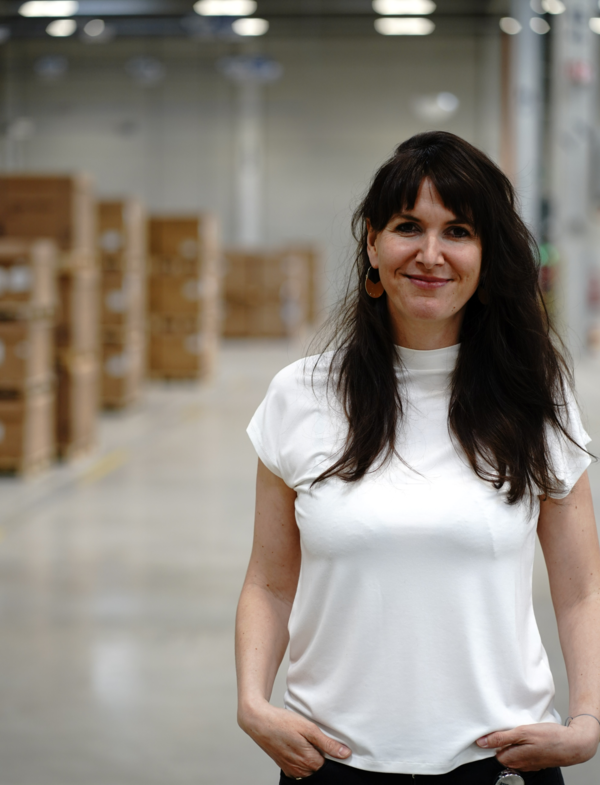
Anna Förster studied Packaging Technology at HTWK Leipzig and started her career in 2008 as a Business Development Manager for Europe at Plantic Technologies. In 2011, she joined the logistics service provider DB Schenker, where she most recently led the Packaging Planning Department within the Region/Area East. Since 2022, she has been the Head of Qualification Management at DP World.
What memories do you associate with your time at HTWK Leipzig?
An exciting, thrilling, and educational time that accompanied me in growing up. New friendships were formed, new interests discovered, and the first challenges had to be overcome. Together, we experienced exam stress as well as the feeling of freedom in discovering and developing ourselves. Within the cohort, a great sense of solidarity emerged, thanks to exciting excursions, practical relevance, and celebrating successes. Twenty years later, alumni meetings feel a bit like family reunions.
What excites you about your current role?
A framework and work environment with plenty of room for creativity, allowing me to work interdisciplinarily. The structural connection to the region enables me to interact with various departments and functions with the goal of improving a little every day and solving problems. Having a positive impact on employee development, designing and piloting training programs, overcoming language barriers, and testing innovative learning environments make my daily work diverse and exciting.
What has been one of your greatest professional challenges, and how did you solve it?
Professionally, building a Competence Center for Packaging Management within Germany. This involved abolishing outdated processes, establishing new standards, and uniting many previously autonomous departments into a cohesive team. Personally, balancing job and private life. With the births of my two children, eight years apart, there was always a fear that this might affect my development and career. There is no recipe for this; the solution and approach are always individual and require perseverance and a lot of strength at times. With a lot of family support, it is certainly possible to continue self-fulfillment.
Who or what has particularly influenced your career path?
Participating in one of the largest Greenfield projects within contract logistics at DB Schenker. My contribution: helping ensure the ramp-up for BMW's overseas logistics supply. Team structures were built, solidified, and developed to work efficiently to achieve and celebrate the set goals together.
What role do professional networks play in your career?
A professional network can play a crucial role in career development. Sharing knowledge and different professional experiences can help discover new job opportunities and receive suitable job offers. It also provides new professional input, which can influence and potentially improve one's own job. Additionally, it's exciting to witness the development of acquaintances and friends and continually meet new people with similar interests and work environments.
What tips or advice would you give young women for their career planning?
Do not underestimate yourself and be aware of your abilities. Confidently claim your space. Show yourself and communicate your achievements in the sense of "Do good and talk about it." Self-promotion plays a significant role, effectively presenting and communicating successes. Active participation in various projects and expressing interest in leadership positions is crucial. Ultimately, it's also about having the courage to change – as my career path shows. Letting go of old habits and comfort zones to face new challenges and keep moving forward to achieve your goals.
What questions or topics can people ask you about?
There is nothing that can't be asked. :)
Dr. Stephanie Franck

Dr. Stephanie Franck studied Civil Engineering at HTWK Leipzig. Afterward, she worked and completed her Ph.D. in the first HTWK junior research group "Resource Conservation and Substance Preservation," focusing on the load-bearing capacity verification of masonry arch bridges using nonlinear FE simulations. Today, she works as an expert in load-bearing structures for wind energy plants at TÜV NORD.
What memories do you associate with your time at HTWK Leipzig?
I fondly remember my diploma and master’s studies as well as my Ph.D. time at HTWK Leipzig. The studies laid a good foundational knowledge, which I was able to deepen during my Ph.D. and apply effectively in my further professional life. I also have fond memories of events like the cube competition, the bridge model competition, and the department's barbecue evenings.
Why did you choose to pursue a Ph.D. at HTWK Leipzig?
Shortly before my master’s graduation, the program for the first junior research group at HTWK Leipzig was established. At that time, Ph.D. students were still rare at HTWK Leipzig. Without the program, I probably would have chosen to enter the professional world instead.
What has been one of your greatest professional challenges, and how did you solve it?
The first experiences with challenges came during my Ph.D. Not always did the expected results occur, and accordingly, the structure of the dissertation had to be reconsidered. In professional life, you are always faced with challenges, whether it’s a new field of work or taking on leadership tasks. I gladly face these challenges because you grow with your tasks.
Who or what has particularly influenced your career path?
I was greatly influenced by my father, who is also a civil engineer. From an early age, as a child and teenager, he took me along to client meetings. I did part of my internships in his office and later supported him in his work. During my studies, I learned a lot from Professor Slowik, who supervised all my theses. I am very grateful for that. He challenged and encouraged me greatly.
What role do professional networks play in your career?
Networks are very important. I found my position at TÜV NORD through a fellow student. He recruited me. To this day, we work successfully together here. I also keep in contact with several other fellow students. It’s great to see how everyone has progressed. In a large company like TÜV NORD, it’s also important to exchange ideas with other areas and look beyond your own field.
What tips or advice would you give young women for their career planning?
Do not shy away from a technical degree. Find out where your professional interests and strengths lie through internships before your studies. Set clear career goals and pursue them, and don’t let setbacks discourage you. A career path doesn’t have to be linear. However, you should never lose your curiosity and drive for knowledge and further education. Often, the best opportunities arise from situations outside your comfort zone. Building a network is not only important for finding a job but also offers a broader perspective.
Andréa Hugen
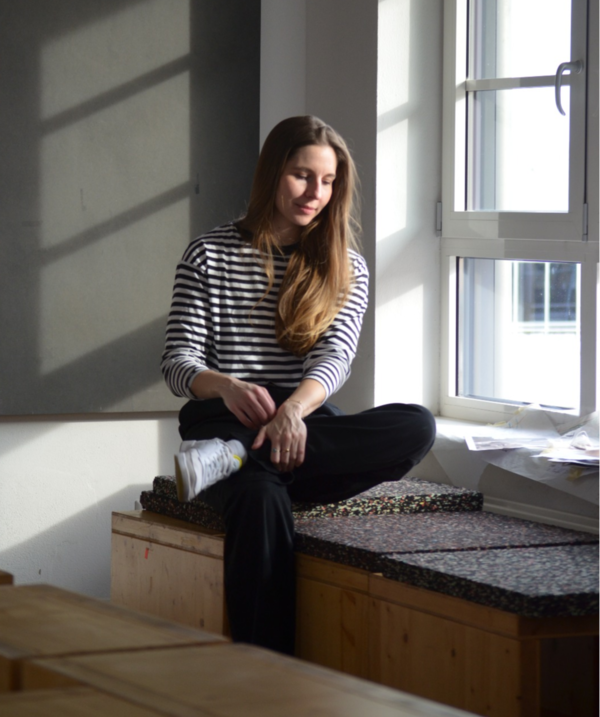
Andréa Hugen completed her Master's degree in Architecture at HTWK Leipzig in February 2022. Through her experiences as a working student in various offices, she quickly realized that she definitely wanted to work in a large, young, and international firm after graduation. Accordingly, she was able to start her career as a Junior Architect in Berlin at JSWD Architekten GmbH & Co. KG.
What memories do you associate with your time at HTWK Leipzig?
I associate only positive things with HTWK. Unfortunately, my studies were marked by COVID-19, but I still enjoyed attending (online) lectures and always felt well-supported by the professors. During that time, I was able to develop personally and further solidify the skills I acquired during my Bachelor's degree (at Alanus University of Arts and Social Sciences). In my opinion, HTWK offers a lot of space for experimental designs and exciting modules. You could always try out a lot and let your creativity run free. I miss my time at university very much and could imagine returning to academia someday. :)
Why did you choose to study at HTWK Leipzig?
The city of Leipzig, its cityscape, and the atmosphere convinced me back then, which is why I chose to study at HTWK.
What has been one of your greatest professional challenges, and how did you solve it?
My biggest professional challenge was transitioning from student life to a full-time job in an office: coordinating between different planners (landscape architects, technical building equipment, interior architects, lighting planners, etc.).
Who or what has particularly influenced your career path?
I worked as a student assistant in various offices – so I knew after graduation that I definitely wanted to work in a large, young, and international office, as I prefer the mentality and workflow in such an office over an older, more traditional one.
What role do professional networks play in your career?
A good professional network can always be helpful. The world of architecture is not particularly large, and sooner or later, circles close. For example, I was recommended to JSWD through a contact, which certainly increased my chances of getting the job.
What tips or advice would you give young women for their career planning?
Don't be afraid of making mistakes or taking on new tasks! Everyone does something for the first time at some point, and that’s how you learn. Our office is not so different from a university: there are trainings on new regulations/DIN standards or CAD programs like Revit/Rhino, working groups you can join, sports programs, flexible hours, etc.
Dr. Mirjam Müller
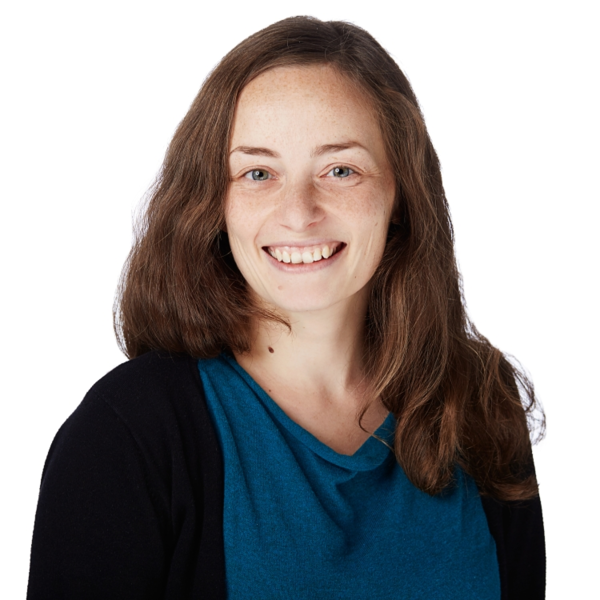
Dr. Mirjam Müller studied Energy and Environmental Technology at HTWK Leipzig. She began working at DBFZ in 2011 as a Research Associate in the Small Plant Technology working group, which she has been acting head of since December 2023. In 2020, she completed her cooperative Ph.D. at the University of Leipzig (Faculty of Chemistry and Mineralogy) in collaboration with HTWK Leipzig (Faculty of Mechanical and Energy Engineering) and DBFZ.
What memories do you associate with your time at HTWK Leipzig?
Numerous ones that would go beyond the scope here – starting from my study period to working in the junior research group.
Why did you choose to pursue a Ph.D. at HTWK Leipzig?
The opportunity for the Ph.D. at HTWK arose through my professor, who had already supervised my diploma thesis, and my working group leader at DBFZ. Through him, I became aware of the junior research group that offered the possibility of a Ph.D. for university of applied sciences students.
What has been one of your greatest professional challenges, and how did you solve it?
So far, it has indeed been completing the Ph.D. The challenge was not only handling the technical tasks alongside my professional duties but also overcoming several administrative hurdles. When I started my Ph.D., it was still new territory for university of applied sciences graduates at the University of Leipzig. Accordingly, the guidelines for the procedure were not clearly defined, and this involved numerous discussions and changes in requirements.
Who or what has particularly influenced your career path?
Certainly, my supervisors during the Ph.D., but also some colleagues and projects with which one works or is engaged longer. It's very difficult to single out something specific – it's more like a big puzzle.
What role do professional networks play in your career?
Networks have been and remain important. Contacts open up many opportunities, ranging from the possibility of pursuing a Ph.D. to carrying out projects through the connection with partners and funding bodies.
What tips or advice would you give young women for their career planning?
I think everyone has to find their own path in life – and in their career as well. From time to time, you should pause to check if you are still heading in the right direction. This applies to your career as a whole as well as to many of the technical topics you are working on.
What questions or topics can people ask you about?
Feel free to ask questions about my current technical work, for example, if you are interested in qualification phases at DBFZ (Bachelor’s/Master’s thesis, internship, interest in a Ph.D.).
Lisett Enge

Lisett Enge studied Book Trade/Publishing B.A. (2011) and Publishing and Trade Management M.A. (2014) at HTWK Leipzig. She began her career through a practical semester as part of her master’s program, followed by a traineeship in search engine marketing and social media marketing. After various positions within the agency, focusing on project management and conception, she is now Head of Content & Creative, responsible for social media marketing, graphics, and video at Projecter GmbH.
What memories do you associate with your time at HTWK Leipzig?
I associate many positive memories with my time at HTWK. It shaped me not only professionally, laying the foundation for my career, but also personally. After all these years, there is still a close network with my former fellow students and now friends.
What excites you about your current job?
Even though my focus is no longer in publishing, it is still the (online) media that engage and shape my daily work. I work very closely with my team, guiding individual colleagues on their career paths and passing on my experiences. I can also actively shape processes within the agency and am heavily involved in the agency's decision-making. The daily work is very diverse, motivating, and, yes, always challenging.
What has been one of your greatest professional challenges, and how did you solve it?
Several come to mind, but offhand, I would say: Returning to work after my second parental leave. I came back as a team lead and had to quickly reacquaint myself with two areas and manage two teams simultaneously. That was a two-year challenge during which I learned a lot about myself and my colleagues. As a leader, project work often takes a back seat. It is more about strengthening and empowering the team to implement projects effectively. I had to learn to recognize my limits and not work on all fronts at once. During this time, I practiced discipline, delegation, and saying no.
Who or what has particularly influenced your career path?
I have always had a close network of experienced colleagues who have supported me with advice and assistance. At Projecter, we also undergo coaching, which trained me as a leader. Additionally, I have a lot of support in my personal life, allowing me to fully concentrate on work during busy times.
What role do professional networks play in your career?
I am rather introverted – hence, I am not drawn to the world of after-work events and networking events. My professional network is therefore based more on contacts I have worked with and who have earned my trust through reliability and quality.
What tips or advice would you give young women for their career planning?
Don’t be afraid to recognize and use your qualities. Don’t be swayed by loud voices, but rather focus on the quiet, strong opinions.
What questions or topics can people ask you about?
Challenges and learnings in developing into a leader of young and dynamic teams.
Johanna Lohse
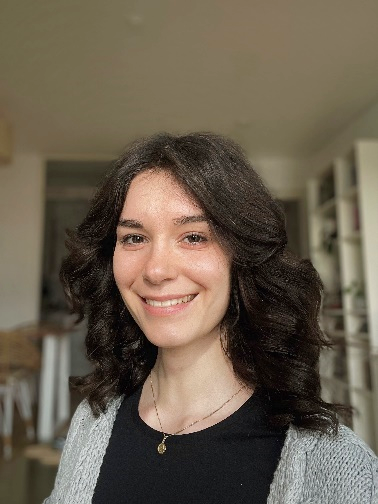
Johanna Lohse completed her bachelor's degree in Book and Media Production at HTWK Leipzig in 2022. During her studies, she completed an internship in publishing production at GROOTHUIS. Gesellschaft der Ideen und Passionen mbH. Since May 2022, she has been employed as a publishing producer at W1 Verlage GmbH in Hamburg, focusing on the production of adult, children’s, and young adult books.
What memories do you associate with your time at HTWK Leipzig?
I associate my time at HTWK with a period full of ups and downs, many practical applications within the program's modules, and forming new, good friendships and acquaintances. Unfortunately, I spent half of my studies in a home office due to the pandemic, so many joint events that could have further strengthened the sense of community were canceled. Despite everything, I learned a lot and was very well prepared for my future career.
Why did you choose to study at HTWK Leipzig?
I was looking for an alternative to a highly creative profession (communication design) and had long been interested in the production of printed materials. Books are cultural goods that I love to support in their dissemination, especially in the field of children's and young adult literature, which is crucial for the upbringing of future generations. These books can positively influence children's development by conveying important values and attitudes through contemporary references and themes.
What has been one of your greatest professional challenges, and how did you solve it?
I started my career and immediately landed in a severely understaffed department. It's no secret that there is a shortage of workers in many areas of the industry. Constant stress and pressure at work shaped my everyday life. We are a department made up of women, and at that time, we truly demonstrated female power. Constant communication, strategic thinking, patience, and team cohesion helped us "survive" this period. But the real solution to the problem was ultimately better staffing.
Who or what has particularly influenced your career path?
I haven’t been working for long, but I would say: my team. I am constantly learning more about my job and the industry. Working alongside women as a woman gives me a good feeling. They show courage and confidence, and it inspires me that my department head is also a woman. The industry itself thrives on female actors, both in publishing and among authors. And that’s a good thing, as there are enough other professions where many more men are employed. However, there are still pay disparities between men and women in the book industry, which will hopefully change due to the large number of female actors. Another important aspect is the respect for sexual and gender diversity, which is increasingly spreading in the book industry and makes me proud to be part of it.
What role do professional networks play in your career?
I’ve only been using LinkedIn for a year and have to say that it really helps me learn more about the industry and make connections. I think you can quickly build a professional network through such platforms, and it definitely helps with job searches.
What tips or advice would you give young women for their career planning?
Confident behavior is really important, and you can work on that. Those who react insecurely and fearfully to every challenge will struggle to grow from them. But everyone starts at the beginning of their career, and it is completely normal to make mistakes. This is part of life and work, and you learn from them for the future. The important thing is to be honest and take responsibility for your mistakes. Then it's not such a big deal. Always remember: it's not your whole life, it's "just" your job, and your boss also makes mistakes. If you don't know something, it's very important to ask questions and seek support. You can't know everything, especially not at the beginning. Communicate honestly and openly and let people help you. And take your time. Mistakes often happen due to hasty actions.
What professional questions or topics can people ask you about?
- Job interviews
- Personal development as a career starter
- The profession of publishing production
Jule Hinkel
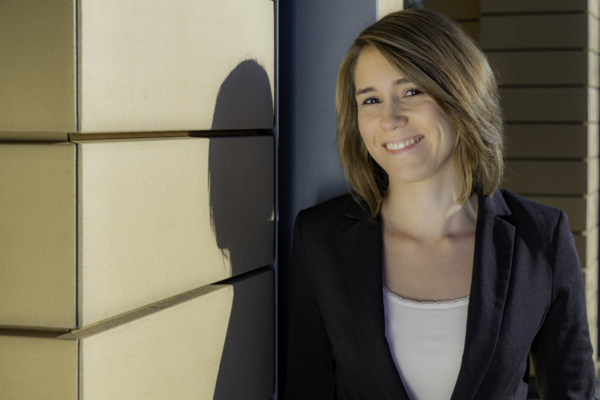
Jule Hinkel completed her Master's degree in Civil Engineering at HTWK Leipzig. During her studies, she led tutorials and wrote a practical thesis in collaboration with the Nature Conservation Association NABU Leipzig. After her master's degree, she started working at Kern-Haus Leipzig, a general contractor, as a planner for single-family home new construction. Starting in April 2024, she will be handling all service phases in both new and old building construction.
What memories do you associate with your time at HTWK Leipzig?
I like the familial atmosphere at the university and fondly remember the lectures, events, and camaraderie there. I also greatly enjoyed my time as a tutor for reinforced concrete, as I love guiding others, helping them, and working independently and creatively.
Why did you choose to study at HTWK Leipzig?
I am from North Rhine-Westphalia and applied nationwide at the time. Ultimately, the city was the decisive factor for me.
What has been one of your greatest professional challenges, and how did you solve it?
The challenge for me is meeting my own high standards. I always want to accomplish everything to everyone's satisfaction, and that is often not possible. It was difficult for me to assert my standpoint outwardly. Personal development work helped me recognize and accept this, so now I can act confidently.
Who or what has particularly influenced your career path?
Firstly, my children, because I have learned a lot about myself through them. Secondly, several people have supported me and repeatedly pushed me to go beyond my limits.
What role do professional networks play in your career?
Networks are very important. However, so far, I have not relied on professional networks for my career path.
What tips or advice would you give young women for their career planning?
Be confident, recognize your strengths and weaknesses, build a network of supporters, and pursue your goal. I notice time and again how much women, in particular, question themselves professionally.
What professional questions or topics can people ask you about?
Feel free to ask me about any topics!
Stephanie Jordan
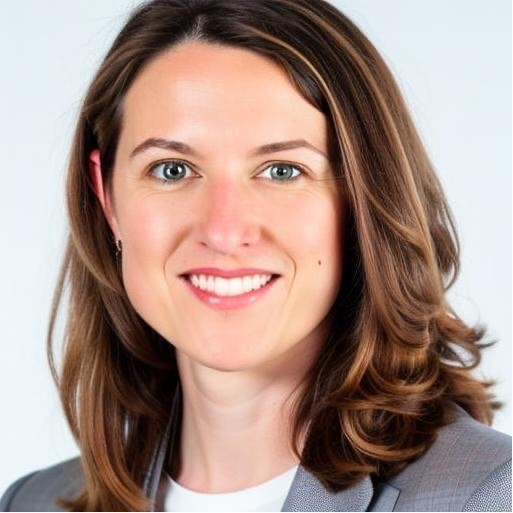
Stephanie Jordan studied Book Trade and Publishing (B.A.) and Publishing Management (M.A.) at HTWK Leipzig. With professional experience in media companies such as Ernst Klett Verlag, Forum Media Group, and Südkurier Medienhaus, she is currently a Business Development Manager at Wanzl and a doctoral candidate at the University of Bayreuth and Neu-Ulm University of Applied Sciences, researching AI in marketing and sales.
What memories do you associate with your time at HTWK Leipzig?
My time at HTWK Leipzig was very formative for me, especially the master's program and the application-oriented teaching, which left a lasting impression. Professor Dieckmann, who supervised my master's thesis, remains a very positive memory. I also appreciate that HTWK provides strong support to students with children.
Why did you choose to study at HTWK Leipzig?
I chose to study at HTWK Leipzig because I had already had positive experiences during my bachelor's studies and appreciated the practical approach of the programs. I specifically wanted to pursue my master's at HTWK because it provides a solid foundation for my dissertation, even though I am not conducting it directly at HTWK. The support from the professors and the pleasant learning atmosphere reinforced my decision. Additionally, Leipzig is a great city to study and live in.
What has been one of your greatest professional challenges, and how did you solve it?
One of my greatest professional challenges was stepping into a leadership position as a young mother and recent graduate. I was fortunate that Südkurier Medienhaus offered me an excellent entry-level position as a Management Associate. My fear that a university degree might not be enough to pursue a doctorate proved unfounded, as I received a lot of support from Neu-Ulm University of Applied Sciences and the University of Bayreuth. With commitment, flexibility, and a willingness to develop, I overcame these challenges.
Who or what has particularly influenced your career path?
The experiences I have had as a mother have significantly influenced my career path. Balancing children and a career is challenging, but possible with structured daily organization and discipline. The decision to pursue a late doctorate has also greatly impacted me. It’s important to understand that research fundamentally differs from practice; not every problem in practice automatically constitutes a research gap.
What role do professional networks play in your career?
Professional networks play a crucial role in my career, especially in research. By participating in conferences and regular doctoral colloquia at the University of Bayreuth and through my membership in the BayWiss Verbundkolleg Economics, I have been able to make valuable contacts and exchange research results.
What tips or advice would you give young women for their career planning?
My advice to young colleagues: Develop self-confidence, set goals, and pursue them consistently. It is important to continuously educate yourself, face new challenges, and be present. This includes professional platforms like LinkedIn.
What professional questions or topics can people ask you about?
I am happy to answer questions about pursuing a doctorate, studying at HTWK Leipzig, and career planning with children.
Susann Resmer
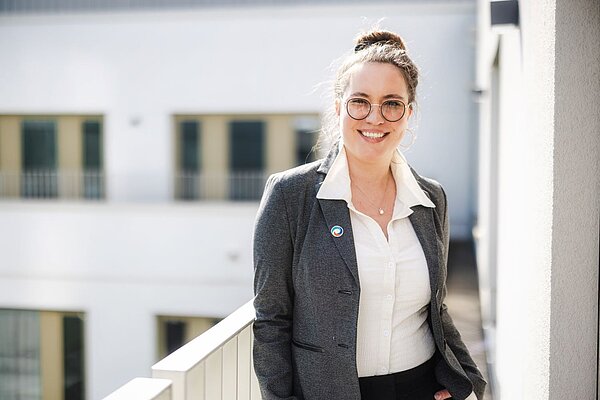
Susann Resmer completed her master's degree in General Management at HTWK Leipzig in 2021. During this time, she also worked as a working student at open ear Start-up consulting. After her studies, she started a traineeship in SAP SuccessFactors Consulting and subsequently worked in various positions at Zalaris Deutschland GmbH. Starting in August 2024, she will take on the position of Team Manager there.
What memories do you associate with your time at HTWK Leipzig?
The solidarity among the students was very strong. We supported each other and created great project work together. As a student "mother," I received a lot of recognition and understanding. The lecturers always pushed my ambition, and the cafeteria wasn't bad either. Now, I am proud that my daughter is also studying at HTWK. This brings back memories.
What excites you about your current job?
It has always been my wish to work in an environment characterized by open communication and with a well-structured and high-performing team. I now get to experience this in my current job. Additionally, I am excited that lifelong learning plays an important role in my job as a Cloud Consultant. There are always new things to discover, and digital development is progressing at an increasingly rapid pace. This is challenging and motivating in a positive way. Another aspect of my enthusiasm lies in the project work itself. I have the opportunity to get to know very interesting companies and their organizational structures. No company is the same, and it feels good to reap the fruits of months of work with the project teams at Go Live, namely the excitement and satisfaction of the customers, with whom we usually remain in contact even after the project is completed.
What was one of your greatest professional challenges, and how did you overcome it?
There was a project that was marked by some hindering influences and disruptive circumstances from the very start. Among other things, a standard was sold by other instances that was impossible to implement in that form. In the team, we created many workarounds to keep the project running, but they didn't always lead to the desired results. The challenge was not to bury our heads in the sand but to deal with what we had and to excite the customer for new ways. Ultimately, many new ideas, knowledge, and "new standards" for future projects emerged from this unusual project.
Who or what has particularly influenced your career path so far?
My career did not follow a straight path but was always influenced by external factors that were both beneficial and hindering for my professional career. Particularly, the "stones" on the path have shaped my personality, making me confident and determined. A recent influential factor is the very honorable offer of a position as Team Manager, which I accepted after some consideration. I am especially looking forward to this challenge. It means that a lot of trust is placed in me and my work.
What importance do professional networks have for your career?
Professional networks are essential in my industry. The SAP SuccessFactors world is small, and you often see people a second time. Therefore, it is important to always be professional, respectful, and reliable. The industry serves a niche with a high demand for suitable candidates who perform this work with passion and professionalism. A good network means good career opportunities, experience exchange, and consolidated knowledge. Sustainable contact with customers is also of particular importance. This can lead to both new assignments and new inspirations.
What tips or advice would you give young women for their career planning?
To my daughter, who falls into this category, I advise being aware of her interests. Passion for a job and seeing a purpose behind it are essential components for job satisfaction. This satisfaction, in turn, strengthens the mind and inspiration, leading to greater professional success. Anyone who wants to climb the career ladder needs, in addition to the mentioned passion, discipline and perseverance. There can definitely be phases of fatigue. In such times, it's important to have sufficient stability in one's private life (such as through friends, family, or hobbies).
On what questions or topics can you be consulted?
- Entry into the SAP world
- Career changes
- Work-life balance
- Studying with a child as a single parent
Dr. Bianca Reichard
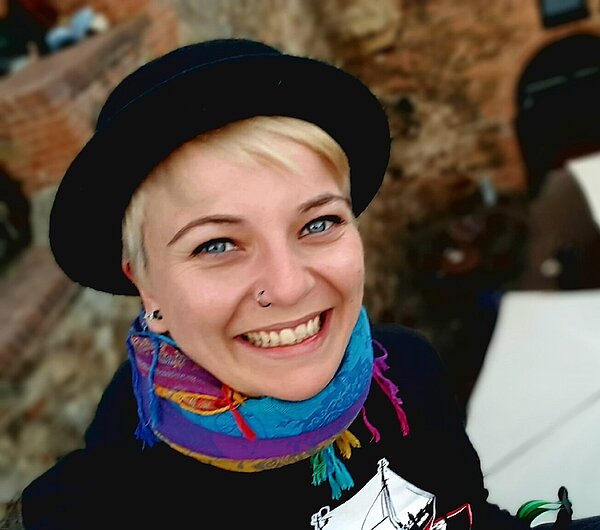
Bianca Reichard studied electrical engineering and information technology at HTWK Leipzig. After her studies, she completed a cooperative doctorate at HTWK Leipzig and Leipzig University (Leipzig Heart Centre) on camera-based, automated pain assessment in bioinformatics and defended her doctorate in November 2024. She is currently looking for a job.
What memories do you associate with your time at HTWK Leipzig?
I associate my academic career to date with HTWK Leipzig, from my bachelor's degree to my doctorate. There were a few hurdles to overcome and I am happy to have mastered them. My time at HTWK Leipzig has taught me a lot. It has made me a well-organised and independent scientist.
Why did you decide to do a doctorate at HTWK Leipzig?
I had already done research on camera-based pain assessment in my Master's degree and conducted a study at the Leipzig Heart Centre. I was very enthusiastic about the topic itself and scientific work, and I still am. In order to be able to continue working on it, I decided to do a cooperative doctorate.
What was one of your biggest professional challenges and how did you overcome it?
The aforementioned study at the Leipzig Heart Centre was very challenging. I recorded video data during ongoing electrophysiological examinations. During the entire minimally invasive procedure, the patients were conscious and expressed their pain. As an electrical engineering student, this surgical set-up presented me with some unexpected challenges, which I rose to.
Who or what has particularly influenced you on your career path so far?
I would say fellow students and professors (no gendering necessary) as well as my supervising university teachers have influenced me equally. I am grateful for the ongoing support of Susann Hannemann from the Graduate Centre throughout my doctorate. For me as a working-class child, the entire academic career was extremely formative and new.
How important are professional networks for your career?
My professional networks are still somewhat limited at the moment, as I have just defended my dissertation in November. I am currently looking for a job within my field of research. I hope that I will be able to expand my professional networks through future jobs.
What tips or advice would you give young women for their career planning?
It is very important to believe in yourself and to be sure that you are on the right path when pursuing an academic career (in electrical engineering). Many people have a lot of advice for PhD students and not all of it is helpful or desirable, so it is especially important to be sure and believe in yourself.
What questions or topics may you be asked about?
- Organisational matters relating to the doctorate
- Scientific work
- Academic careers in male-dominated professional fields
- In general, anything the reader is interested in :)
Dr. Ulrike Leistner
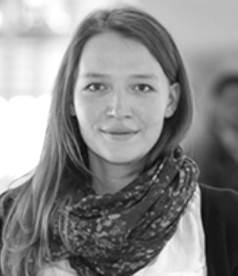
Ulrike Leistner studied social work at the HTWK Leipzig. From 2010 to 2017, she was a researcher in the ‘Social and Health’ research group and completed a cooperative doctorate at TU Dresden on trust in social service providers and public authorities and the comprehensibility of health information. Since then, she has been coordinating municipal health promotion at the Leipzig Health Department.
What memories do you have of your time at HTWK Leipzig?
My studies were some time ago. I still have fond memories of the lively discussions in the seminars and joint study groups, where there was always room for fun.
Why did you decide to study / do a doctorate at HTWK Leipzig?
I was able to choose between two study programmes and deliberately opted for the HTWK because it had a good professional reputation and Leipzig is a great city that I would have found difficult to leave.
What was one of your biggest professional challenges and how did you overcome it?
Shortly before the end of my ESF doctoral scholarship, I was offered the project position to establish the Health Coordination Centre in Leipzig, which was later firmly anchored in the city of Leipzig. There were only a few chapters left in my dissertation, so I accepted at the time. The biggest challenge for me was my work-life balance in order to successfully complete my doctorate as a single mother at the time alongside a new full-time job.
Who or what has particularly influenced you on your career path so far?
Professionally, I owe a great deal to the Social and Health Research Group led by Prof Gesine Grande. I am still in contact with many members today.
How important are professional networks for your career?
Networks at neighbourhood, municipal, state and national level are essential for my work. Together, we can often get things rolling that would never be possible alone. This requires a high degree of professionalism, reliability, sometimes also a large dose of frustration tolerance and cooperation that can also be fun.
What tips or advice would you give young women for their career planning?
Life is never straightforward. It's good to set yourself goals, keep at it and look for allies.
What professional questions or topics can you be asked about?
I am happy to answer questions about the cooperative doctoral programme and networking.